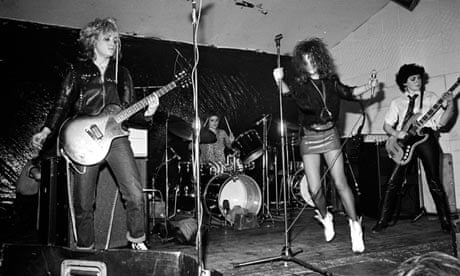Viv Albertine, guitarist
We were all virgins when it came to composing and writing, but we liked the ideology of Malcolm McLaren and Vivienne Westwood: always questioning things. That fed into our music. We knew we were a first, which could be uncomfortable, and we were much more revolutionary than the Pistols and the Clash. They were rock bands, whereas we were using world music and reggae, filtered through our own musicality.
We were like a female Spinal Tap, really: we argued, toured and wanted to make a classic album that never dated. Island, our label, got Dennis Bovell to produce it. They said he had very broad musical knowledge – he liked everything from white rock to reggae, which sounded perfect. We were also drawing on other influences: our favourite album was Dionne Warwick Sings Burt Bacharach, which we deconstructed. My guitar style was based on the anonymous guitarist on that.
So in the spring of 1979, we were dispatched to Ridge Farm in Surrey. Dennis was trapped with all these girls! He and Ari [Forster, singer] were very strict. I'd only been playing for 18 months and was with these control freaks. I often went to bed in tears, wondering what humiliation waited for me the next day, what weaknesses would be revealed in my playing. When I was playing Newtown, they kept saying: "You're not getting it." By the end, I was so furious I just thrashed at the guitar and made strange noises. Over the intercom came: "That was fantastic!"
Dennis corralled us into shape and tidied up all the ends, but without trampling on creativity. It was so rare for a man in the 1970s to put himself inside the heads and hearts of four crazy young women. Budgie [Peter Clarke, drummer] also helped pull it all together. Ari was very communicative about how things should sound and Budgie could take that from a girl who was 17. He had a feminine sensibility. They were extraordinary men to come across. Ari, in her German-Jamaican accent, would tell them exactly what she wanted from the hi-hat.
The album cover was shot in the rose garden. We wanted a warrior stance, to be a tribe. We were egging each other on, and the next thing you know we were sitting in the mud, smearing it over each other. We knew, since we had no clothes on, that we had to look confrontational and hard. We didn't want to be inviting the male gaze.
Dennis Bovell, producer
Chris Blackwell from Island Records told me: "I've signed this group and I don't know what to do with them. It's a girl group, a punk band." He gave me some cassettes of them live and I thought: "Yeah, they certainly can play." And I agreed to do the album.
We were in the studio for 10 weeks, and it was solid work. The band had clear ideas about what they wanted. Ari, Tessa [Pollitt, bassist] and Viv had written the songs; they just needed me to shape them. We worked from nine in the morning till late. Then I'd tell them, "Off you go to bed," so I could fix things. And Ari would say, "No, I'm not going to bed!" She would always insist on being there if I was doing anything to the music.
They weren't good at reggae, but they were keen to learn. In Newtown, I'm on keyboards and percussion. It's about drug-taking, but the drugs were football and TV. I got hold of an ashtray, a spoon and a box of matches and that was my percussion: shaking the matches, tapping the ashtray with the spoon and occasionally striking a match. The ashtray was symbolic of smoking, the spoon of heroin. They said: "You're mad!" We were using a mixing desk that belonged to Jon Anderson of Yes. We weren't supposed to be, but he was on tour. Ari carved on the desk: "Ari was here."
I got a bit of a shock when they did the cover. I went off to have a quick dip in the pool while they were shooting it. When they finished, the owner's son said: "Why don't you jump in the pool to get the mud off?" I said: "No!" But they jumped in anyway. There's a photo of me in there with them. I've tried to get hold of the negative.

Comments (…)
Sign in or create your Guardian account to join the discussion